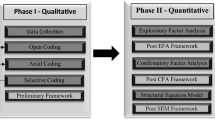Abstract
While an increased importance of value co-creation both in practices and academia, the extant literature seems to have its focus on its conceptual development, and thus the empirical studies on value co-creation are scantly reported and under-explored. This study thus fills up this research gap, and empirically tests this value co-creation theory, by using related constructs, i.e., experience co-creation, employer branding, employee engagement, employee loyalty, customer loyalty, intensity of co-creation, and by illustrating both customers and employees as interactive actors in the co-creation processes. By doing so, this study has its importance, because it presents one of few studies, empirically test the value co-creation theory, particularly in the customer-employee relationships.
This study uses survey as its research method, and collects 240 questionnaires from several service industries, such as insurance, banking, real estate, and retailing. Data is analyzed via. Partial Least Squares (PLS). The following results are found: (1). Experience co-creation has positive effects on both employer branding and employee engagement, both of which, in turn, have positive impacts on employee loyalty; (2). Employee loyalty, surprisingly, has no direct and positive effects on customer loyalty; (3). Experience co-creation has a significant effect on value co-creation, which then positively influences customer loyalty.
This study is important for the following reasons: (1). Departs from prior studies focusing on customers only, and further proposes an innovative and interactive model of customer loyalty, mutually co-created between customers and employees, particularly in the service contexts; (2). Demonstrates the mediating roles of employees’ psychological processes, i.e., employer branding, employee engagement and employee loyalty, in developing customer loyalty, and thus proposes a process model of customer loyalty with a focus on employee, ignored by prior literature; (3). Empirically demonstrates the validities of three theories, i.e., encounter processes, JD-R (Job Demands-Resource), value co-creation, applied in the customer loyalty model.
Access this chapter
Tax calculation will be finalised at checkout
Purchases are for personal use only
Similar content being viewed by others
Author information
Authors and Affiliations
Corresponding author
Editor information
Editors and Affiliations
Rights and permissions
Copyright information
© 2020 The Academy of Marketing Science
About this paper
Cite this paper
Huang, CC. (2020). Experience Co-creation, Employer Branding, Customer Loyalty: A Multi-level Analysis: An Abstract. In: Pantoja, F., Wu, S., Krey, N. (eds) Enlightened Marketing in Challenging Times. AMSWMC 2019. Developments in Marketing Science: Proceedings of the Academy of Marketing Science. Springer, Cham. https://doi.org/10.1007/978-3-030-42545-6_194
Download citation
DOI: https://doi.org/10.1007/978-3-030-42545-6_194
Published:
Publisher Name: Springer, Cham
Print ISBN: 978-3-030-42544-9
Online ISBN: 978-3-030-42545-6
eBook Packages: Business and ManagementBusiness and Management (R0)




